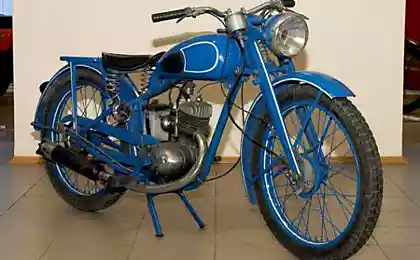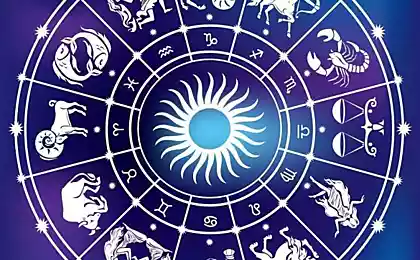576
Rare people: Digor
They remained on Earth for two hundred people. Of the Digor almost destroyed by the soldiers of Tamerlane, the Kabardian princes and persecution of Soviet power.
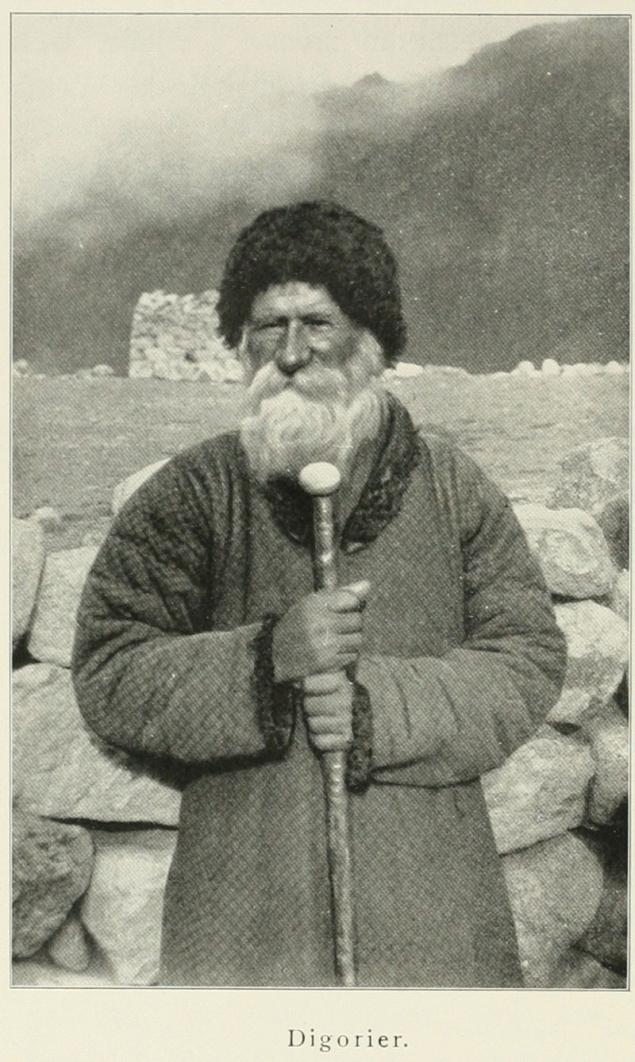
Among the small peoples of Russia there are those that did not succumb to the influence of time and neighbors and have maintained their lifestyle and culture. Their way of life for thousands of years virtually unchanged, and the ancient beliefs, traditions and language are preserved. Because of its isolated way of life about which little is known. "My planet" has decided to make their Red book of the peoples of Russia, whose culture tomorrow may disappear.
History of the Digor goes back to the time when the Scythian-Sarmatian tribes roamed from the don to the Danube. In the III century BC they all disappeared in the Great migration. The only exception is the ancient Alans, created in the foothills of the Caucasus powerful the Kingdom of Alania. Over time they mixed with the indigenous population. Modern Ossetians are direct descendants of the ancient Alan, are divided into two sub-ethnic groups: irons and digors. According to the 2010 census, only 223 people called themselves Digor.
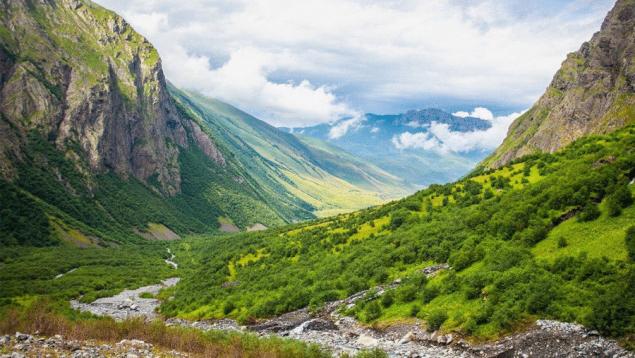
Legend has it that the tragic fate of the ancestors of the Digor could be different if the great Tamerlane had met on the road through the Caucasus detachment very warlike Alan girls. The soldiers of Tamerlane, seeing festively dressed girls with musical instruments in hand, of course, jumped from their horses, ran: girl we meet! And the girls put musical instruments, took the arrow and killed them all. And then Tamerlan said, "Destroy Alan, from the womb to old age!"
In the early fourteenth century, the ancestors of the Digor — Alana really had a Tamerlane unprecedented resistance. The confrontation could have ended in a total extermination. A great nation and his descendants rescued a woman from a mountain village Zadalesk that has collected in the surrounding mountains of the surviving orphans and nursed in a cave. The legendary Nan that means in Digorskiy "mother", revered in the Caucasus, far beyond Digoria-just one.
Later, from a small shelter under the ground the children moved into the cave a little more, a little higher up the slope. How many sacrificial animals are eaten in subsequent years they or their descendants are now considered. People have survived.
Day of the beast, Aleardi
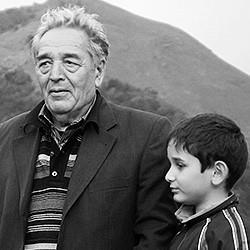
Zarak S. of Tobo and his grandson Serezha
In the former village of Volno-Hristianskoi, and now the city of Digora, North Ossetia lives Zarak S. of Tobo. Local celebrity and expert on the usages of the poet and elder of his district, Zarak finishes a book about his native place.
Zarak and his grandson Serezha live on a fertile plain, 80 km from the rigors of the Digorsky gorge. Today the house Caraka and the Digoria-just one big holiday: day of the beast by the name of Alauni. Holiday is very unusual.
In the complex Pantheon of ancient Digor deities and spirits of nature terrible, Aleardi occupies a special place. Ancient pagan beliefs intertwined with the Christianity that came here in the early middle Ages.
The digorians are not made to represent the spirits of nature, and it looks like Aleardi is unknown. Who will look Alouni, he falls ill with smallpox. One thing is clear: Aleardi — Ghost threat, and cajole his Digor thoroughly. Women begin the day by preparing of sacred cakes.
While the women knead the dough and prepare toppings in the yard Caraka dominate men. The first toast, dedicated to the fierce, Aleardi, washed down with milk.
On major holidays the digorians sacrifice animals. Each house is struggling: someone prepared a Turkey, another a sheep, and someone — even a bull. It all depends on income. In the house Caraka day, Aleardi selected sheep.
Sacrificial sheep cauterize the hair on the forehead to the sacred smoke flew to the Almighty God and the sacrifice was graciously accepted. While in the yard of the boiling cauldron with lamb, women with children of their business. Towards noon to the sacred grove of the Digor begin to constrict the rows of worshipers. Men in the ritual are not involved. Aleardi — primarily women's and children's party. Each family three times, will pass a sacred tree with prayer and offerings. In the course of except for cakes will go the milk, sour cream, meat, and wool and ribbons. Heart and blood Aleardi need to mitigate.
Home in the mountains
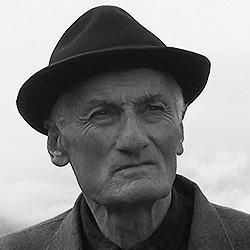
Kim G. Chibisov
Early in the morning Zarak and Serge going on a journey: they go to the mountains, to places where their family lived.
Other Caraka name is Kim. Kim G. Chibisov. All his life he lives on the edge of the Digor gorge in the highland village of Dunta. He worked as a driver, built a house, raised children. Master of his land as any farmer. With one exception: to survive in these places is incredibly hard, the land here is scarce, and once inhabited the mountains of the neighbors at Kim's almost gone. Moved to the valley, where it is easier. In these mountains, where Zarak boy came to visit his great-grandfather, passed their total with Kim's childhood. Separated by distance and everyday worries, Kim and Zarak had not seen for ten years.
Until the late eighteenth century output in a fertile valley that belonged to a Kabardian princes, for of the Digor was closed. They actually locked in the Armenian highlands. In the XVIII century Digoriya after the rest of Ossetia was among the first in the North Caucasus joined the Russian Empire. Freed from the power of the Kabardian princes, the digors had begun to move from the mountains once belonged to the ancestors-the Alans of the valley.
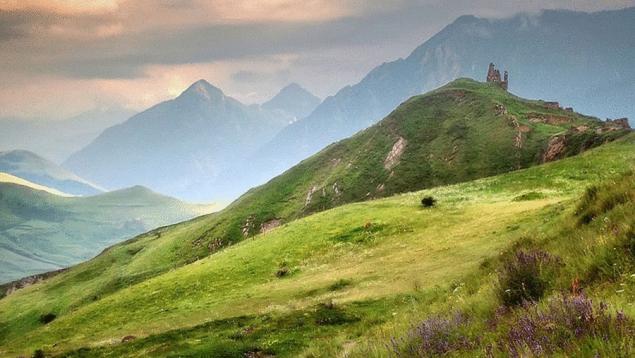
In 1852, on the plains in front of the Digorsky gorge was founded two settlements: the free Hristianskoe and Loosely-Mohammedan. In one settled Digor-Christians, in other — their neighbors, who had to adopt during the domination of Kabardins Islam. It is now and Digora, Chikola. However, part of the Digor to move into the fertile valley and did not want to remain in the mountains.
In 1937 the Digor language was declared counter-revolutionary and is actually prohibited. Training in the schools of that time were held exclusively in the iron dialect of the Ossetian language as the most common. However, compared to iron Digor more archaic and much closer to the language of the ancient Alans. Digarec can easily read the ancient texts, and ironic — no.
At the entrance to severe Digor gorge travelers meets St. George. Not after the one God of this Saint, who was worshiped would be the Digor more St. George (Washery in Digor). Praise and prayer ascends to him at any table and at the beginning of each case. Washery, patron of warriors and travelers, is an exclusively male Saint. Women in these sanctuaries are not allowed.
Understanding the local population is familiar to us the young man killing the snake, transformed into a mighty bearded warrior from the ancient Ossetian epic flying on a three-legged horse. Hence the three-legged sacrificial table, and traditional triangular pies in honor of the Saint. Even numbers are found in the rituals of the Digor only on sad occasions.
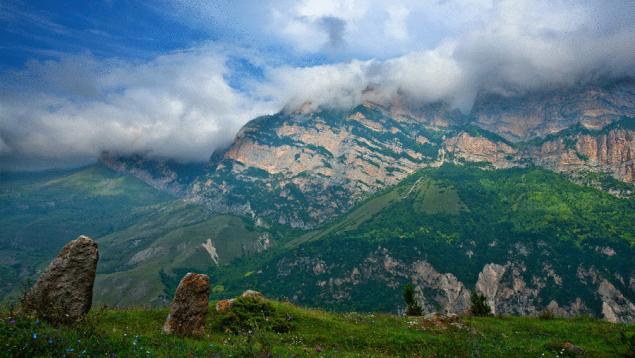
While Zarak and Serge slowly but surely overcome the mountain cliffs, and Kim preparing for a meeting. Caraka and Kim are United not only by friendship since childhood. Kim lives in places where the kind Caraka and many other Digor. Kim — the Keeper of the memory and guarantee that these places still have a boss.
Lonely Kim thought for today comes to an end. Familiar with the car struggling to overcome the latest obstacle.
In one of the remaining houses Zarak and Sergei find cherished items of everyday life of past generations. The chain, on which hung boiler, passed on by inheritance. Grandfather and grandson Toboev get to the main purpose of the trip. Zarak shows Sergei the house of his ancestors where many years ago they migrated to the plains.
How many more memories, meetings with villagers, thank-you toasts and wishes of good and peace! How many stories, how many nebula will they tell each other!
Watching the wonders of his native land, Serge, it seems, falls asleep standing up. Before bed grandpa tell him a story about the hero Soslan.
I did not listen to the tale. He sleeps, and he dreams of the mighty sled, Scythians, Sarmatians, Alans, battle and adventure. Tomorrow it is waiting for a long way home on the plain. But the old man still have something to talk about together. But more importantly for Caraka and Kim — quiet together. After all, they share not only a long friendship, but a common grief. Each of them has lost at the time, two children, and only fathers who have lost children, can understand each other. In the silence of their native mountains.
Tomorrow they would part. How — the knowledge of God. Kim stays upstairs to guard the ancestral tower, and Carak will return to the valley to finish the book.
Disappeared in history warlike nomads, the Scythians, left Sarmatian tribes, was not the great of the Kingdom of Alania. No Kabardian princes and Imperial Russia. And Digor language lives, breaking the prohibitions of the Stalin era and official oblivion. This language will sound true, like a legend, and fiction, who believe Willy-nilly. There will be stories. Someday I will tell them bedtime stories to her grandchildren. In Digor. published
P. S. And remember, just changing your mind — together we change the world! ©
Source: project.moya-planeta.ru/redkie_ludi_digortsi/

Among the small peoples of Russia there are those that did not succumb to the influence of time and neighbors and have maintained their lifestyle and culture. Their way of life for thousands of years virtually unchanged, and the ancient beliefs, traditions and language are preserved. Because of its isolated way of life about which little is known. "My planet" has decided to make their Red book of the peoples of Russia, whose culture tomorrow may disappear.
History of the Digor goes back to the time when the Scythian-Sarmatian tribes roamed from the don to the Danube. In the III century BC they all disappeared in the Great migration. The only exception is the ancient Alans, created in the foothills of the Caucasus powerful the Kingdom of Alania. Over time they mixed with the indigenous population. Modern Ossetians are direct descendants of the ancient Alan, are divided into two sub-ethnic groups: irons and digors. According to the 2010 census, only 223 people called themselves Digor.

Legend has it that the tragic fate of the ancestors of the Digor could be different if the great Tamerlane had met on the road through the Caucasus detachment very warlike Alan girls. The soldiers of Tamerlane, seeing festively dressed girls with musical instruments in hand, of course, jumped from their horses, ran: girl we meet! And the girls put musical instruments, took the arrow and killed them all. And then Tamerlan said, "Destroy Alan, from the womb to old age!"
In the early fourteenth century, the ancestors of the Digor — Alana really had a Tamerlane unprecedented resistance. The confrontation could have ended in a total extermination. A great nation and his descendants rescued a woman from a mountain village Zadalesk that has collected in the surrounding mountains of the surviving orphans and nursed in a cave. The legendary Nan that means in Digorskiy "mother", revered in the Caucasus, far beyond Digoria-just one.
Later, from a small shelter under the ground the children moved into the cave a little more, a little higher up the slope. How many sacrificial animals are eaten in subsequent years they or their descendants are now considered. People have survived.
Day of the beast, Aleardi

Zarak S. of Tobo and his grandson Serezha
In the former village of Volno-Hristianskoi, and now the city of Digora, North Ossetia lives Zarak S. of Tobo. Local celebrity and expert on the usages of the poet and elder of his district, Zarak finishes a book about his native place.
Zarak and his grandson Serezha live on a fertile plain, 80 km from the rigors of the Digorsky gorge. Today the house Caraka and the Digoria-just one big holiday: day of the beast by the name of Alauni. Holiday is very unusual.
In the complex Pantheon of ancient Digor deities and spirits of nature terrible, Aleardi occupies a special place. Ancient pagan beliefs intertwined with the Christianity that came here in the early middle Ages.
The digorians are not made to represent the spirits of nature, and it looks like Aleardi is unknown. Who will look Alouni, he falls ill with smallpox. One thing is clear: Aleardi — Ghost threat, and cajole his Digor thoroughly. Women begin the day by preparing of sacred cakes.
While the women knead the dough and prepare toppings in the yard Caraka dominate men. The first toast, dedicated to the fierce, Aleardi, washed down with milk.
On major holidays the digorians sacrifice animals. Each house is struggling: someone prepared a Turkey, another a sheep, and someone — even a bull. It all depends on income. In the house Caraka day, Aleardi selected sheep.
Sacrificial sheep cauterize the hair on the forehead to the sacred smoke flew to the Almighty God and the sacrifice was graciously accepted. While in the yard of the boiling cauldron with lamb, women with children of their business. Towards noon to the sacred grove of the Digor begin to constrict the rows of worshipers. Men in the ritual are not involved. Aleardi — primarily women's and children's party. Each family three times, will pass a sacred tree with prayer and offerings. In the course of except for cakes will go the milk, sour cream, meat, and wool and ribbons. Heart and blood Aleardi need to mitigate.
Home in the mountains

Kim G. Chibisov
Early in the morning Zarak and Serge going on a journey: they go to the mountains, to places where their family lived.
Other Caraka name is Kim. Kim G. Chibisov. All his life he lives on the edge of the Digor gorge in the highland village of Dunta. He worked as a driver, built a house, raised children. Master of his land as any farmer. With one exception: to survive in these places is incredibly hard, the land here is scarce, and once inhabited the mountains of the neighbors at Kim's almost gone. Moved to the valley, where it is easier. In these mountains, where Zarak boy came to visit his great-grandfather, passed their total with Kim's childhood. Separated by distance and everyday worries, Kim and Zarak had not seen for ten years.
Until the late eighteenth century output in a fertile valley that belonged to a Kabardian princes, for of the Digor was closed. They actually locked in the Armenian highlands. In the XVIII century Digoriya after the rest of Ossetia was among the first in the North Caucasus joined the Russian Empire. Freed from the power of the Kabardian princes, the digors had begun to move from the mountains once belonged to the ancestors-the Alans of the valley.

In 1852, on the plains in front of the Digorsky gorge was founded two settlements: the free Hristianskoe and Loosely-Mohammedan. In one settled Digor-Christians, in other — their neighbors, who had to adopt during the domination of Kabardins Islam. It is now and Digora, Chikola. However, part of the Digor to move into the fertile valley and did not want to remain in the mountains.
In 1937 the Digor language was declared counter-revolutionary and is actually prohibited. Training in the schools of that time were held exclusively in the iron dialect of the Ossetian language as the most common. However, compared to iron Digor more archaic and much closer to the language of the ancient Alans. Digarec can easily read the ancient texts, and ironic — no.
At the entrance to severe Digor gorge travelers meets St. George. Not after the one God of this Saint, who was worshiped would be the Digor more St. George (Washery in Digor). Praise and prayer ascends to him at any table and at the beginning of each case. Washery, patron of warriors and travelers, is an exclusively male Saint. Women in these sanctuaries are not allowed.
Understanding the local population is familiar to us the young man killing the snake, transformed into a mighty bearded warrior from the ancient Ossetian epic flying on a three-legged horse. Hence the three-legged sacrificial table, and traditional triangular pies in honor of the Saint. Even numbers are found in the rituals of the Digor only on sad occasions.

While Zarak and Serge slowly but surely overcome the mountain cliffs, and Kim preparing for a meeting. Caraka and Kim are United not only by friendship since childhood. Kim lives in places where the kind Caraka and many other Digor. Kim — the Keeper of the memory and guarantee that these places still have a boss.
Lonely Kim thought for today comes to an end. Familiar with the car struggling to overcome the latest obstacle.
In one of the remaining houses Zarak and Sergei find cherished items of everyday life of past generations. The chain, on which hung boiler, passed on by inheritance. Grandfather and grandson Toboev get to the main purpose of the trip. Zarak shows Sergei the house of his ancestors where many years ago they migrated to the plains.
How many more memories, meetings with villagers, thank-you toasts and wishes of good and peace! How many stories, how many nebula will they tell each other!
Watching the wonders of his native land, Serge, it seems, falls asleep standing up. Before bed grandpa tell him a story about the hero Soslan.
I did not listen to the tale. He sleeps, and he dreams of the mighty sled, Scythians, Sarmatians, Alans, battle and adventure. Tomorrow it is waiting for a long way home on the plain. But the old man still have something to talk about together. But more importantly for Caraka and Kim — quiet together. After all, they share not only a long friendship, but a common grief. Each of them has lost at the time, two children, and only fathers who have lost children, can understand each other. In the silence of their native mountains.
Tomorrow they would part. How — the knowledge of God. Kim stays upstairs to guard the ancestral tower, and Carak will return to the valley to finish the book.
Disappeared in history warlike nomads, the Scythians, left Sarmatian tribes, was not the great of the Kingdom of Alania. No Kabardian princes and Imperial Russia. And Digor language lives, breaking the prohibitions of the Stalin era and official oblivion. This language will sound true, like a legend, and fiction, who believe Willy-nilly. There will be stories. Someday I will tell them bedtime stories to her grandchildren. In Digor. published
P. S. And remember, just changing your mind — together we change the world! ©
Source: project.moya-planeta.ru/redkie_ludi_digortsi/








